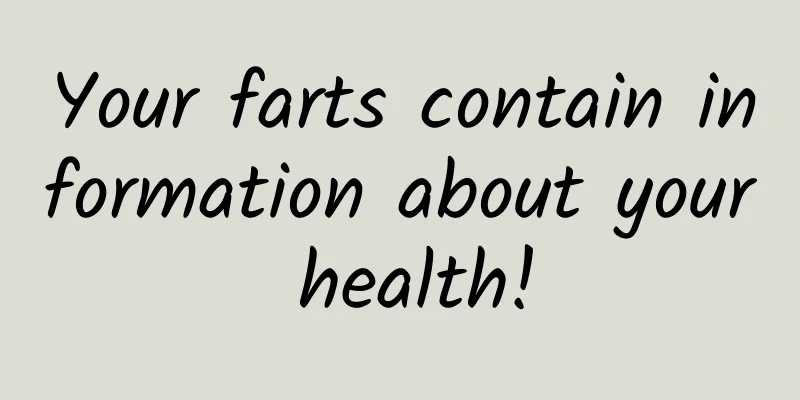Your farts contain information about your health!

|
Farting is generally a good thing, as the accumulation of gas in the abdomen can cause uncomfortable bloating and pain. But that doesn’t mean you should ignore them completely. Paying attention to their frequency, smell, and if they occur along with other gastrointestinal symptoms can provide clues to what’s going on in your body, and even indicate some potentially serious conditions.[1] It is medically proven that farting can help you understand the condition of your stomach and intestines. Here are some things you should pay attention to: no farts are not necessarily a good thing, too many farts may be a bad thing, and smelly farts may indicate trouble. Some people are very proud of themselves, thinking that they never fart or fart very rarely. In fact, people who fart are healthier than those who don't! A patient once said that he had not farted or pooped for several days, and had abdominal pain. After examination by a doctor, it was found that this was a precursor to intestinal obstruction. The reason was that the patient ate too much meat in the first month of the year and did not exercise enough, which caused food accumulation in the abdomen, obstructed gastrointestinal function, and poor detoxification. Some people try every possible means to hold back their farts. This may seem to solve the embarrassment caused by loud and smelly farts, but it may actually indicate some health problems. Did you know that people fart 8 to 20 times a day? In most cases, we are completely unaware that our anus has quietly released gas [2]. If we hold back our farts frequently, it will not only increase the burden on our body, but may also cause chronic poisoning of the body, causing abdominal distension, abdominal pain, chest tightness, and even peritonitis, intestinal obstruction and other diseases. Secondly, you should not take excessive farting lightly. Excessive farting refers to the anal gas volume that is much larger than usual. There are many reasons, such as indigestion, gastritis, peptic ulcer and other stomach diseases, liver, gallbladder, pancreas diseases, etc. Indigestion can be divided into functional and organic. The former is related to gastrointestinal motility disorders; the latter is related to intestinal inflammation, cancer and other diseases. Excessive farts may also be caused by the intake of starchy and protein foods such as beans, potatoes, eggs, etc., or by gulping down or habitually swallowing too much, swallowing saliva frequently and taking in more air, etc. Therefore, it is recommended that you should not be careless when you fart too much. It is best to go to the hospital for a check-up to clarify the cause of excessive farting and then prescribe the right medicine. In addition, if the farts are extremely smelly, you should not be careless. It may be due to indigestion, excessive intake of meat and acidic foods, or due to gastrointestinal bleeding, blood stagnation in the intestinal cavity, or inflammation in the intestines such as bacillary dysentery, amoebic dysentery, ulcerative colitis, hemorrhagic enteritis, etc. In addition, in the late stage of malignant tumors, due to the erosion of cancerous tissues and the corruption of proteins, due to the action of bacteria, the farts will also be very smelly. Sometimes, eating too much garlic, onions, leeks and other pungent foods can also make the farts smelly, but there is no need to worry about it. To summarize briefly: 1. If you fart too much and they smell bad, you should consider whether you have indigestion. 2. If you fart a lot but it doesn’t smell bad, you should consider stomach problems such as gastritis and peptic ulcer. 3. If the farts are particularly smelly, there may be problems such as gastrointestinal bleeding, bacillary dysentery, amoebic dysentery, ulcerative colitis, and hemorrhagic enteritis. 4. If you fart very little, or do not fart at all, and at the same time have symptoms such as abdominal pain, bloating, constipation, increased or absent bowel sounds, and watery sounds when breathing, you should consider whether you have intestinal obstruction. So the more you fart, the better. Of course, too little farting is also a problem. Simply learning to judge the body signals released by farts will help you understand your body more calmly. References: 1. Li Yu. Farts may be important clues to physical health[J]. Oriental Health, 2021(05):9. 2. Liu Sailiang, Qin Jun. Farting is healthier [J]. Public Health, 2019(12):107. |
<<: Epic moves! How difficult is the 4A challenged by Yuzuru Hanyu? 4.5 turns in one second...
>>: When using chopsticks, beware of hidden dangers
Recommend
The efficacy and function of Pao Zhang fruit
In today's society, health preservation seems...
Global Science News | List of Highly Cited Scholars in 2021 Announced
· the scientist· Clarivate Analytics announces 20...
Can robots give birth to babies? Are they considered living organisms? Experts explain
Recently, American researchers discovered a new w...
The U.S. Army is "making up for" field air defense and developing laser air defense weapons, perhaps because air superiority has been lost
The U.S. Army is getting closer to fielding its D...
Yuan Longping's wish for the Year of the Ox is just eight words, and netizens heard it: It will definitely come true
January 29 Hunan Satellite TV's Spring Festiv...
Should you avoid eating mutton, seafood, tofu and other "irritating foods" when you are injured? The answer is surprising
Author: Zhang Yu, Researcher, Institute of Nutrit...
The efficacy and function of Junqianzi
Junqianzi has a long history, and up to now, its ...
Did the ginkgo tree, which has an unbalanced “male-female ratio”, also have a large population in the past?
Ginkgo seems to be a very common and ordinary pla...
Cycling 50 kilometers without worrying about punctures? What is the difference between shared bikes and ordinary bikes?
Audit expert: Zhou Hongzhi Senior Experimentalist...
What are the medicinal values of cauliflower?
Nowadays, more and more people pay attention to h...
Can I drink Chinese medicine at night?
As people learn more and more about medical knowl...
Ancient landmasses swirl, foreign visitors come to visit... What has the Earth experienced in the long 4.6 billion years?
Map: Zhou Aojun Reviewed by: Zhao Xuting, Zhao Zi...
Neolithic "Meteor Hammer" Discovered!
Recently, Chen Zuhua, a citizen of Nanchang City,...
See the big picture from the small details and make science within reach: Science Popularization China Lite is here!
On January 16, 2024, at the "2023 Science Po...
Commelina purpurogena
In everyone's life, people often accidentally...









